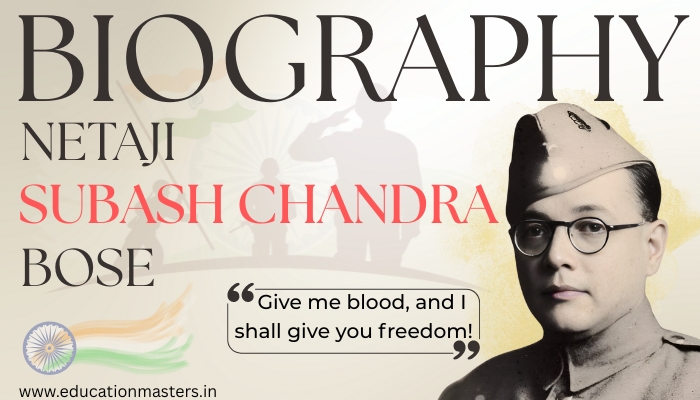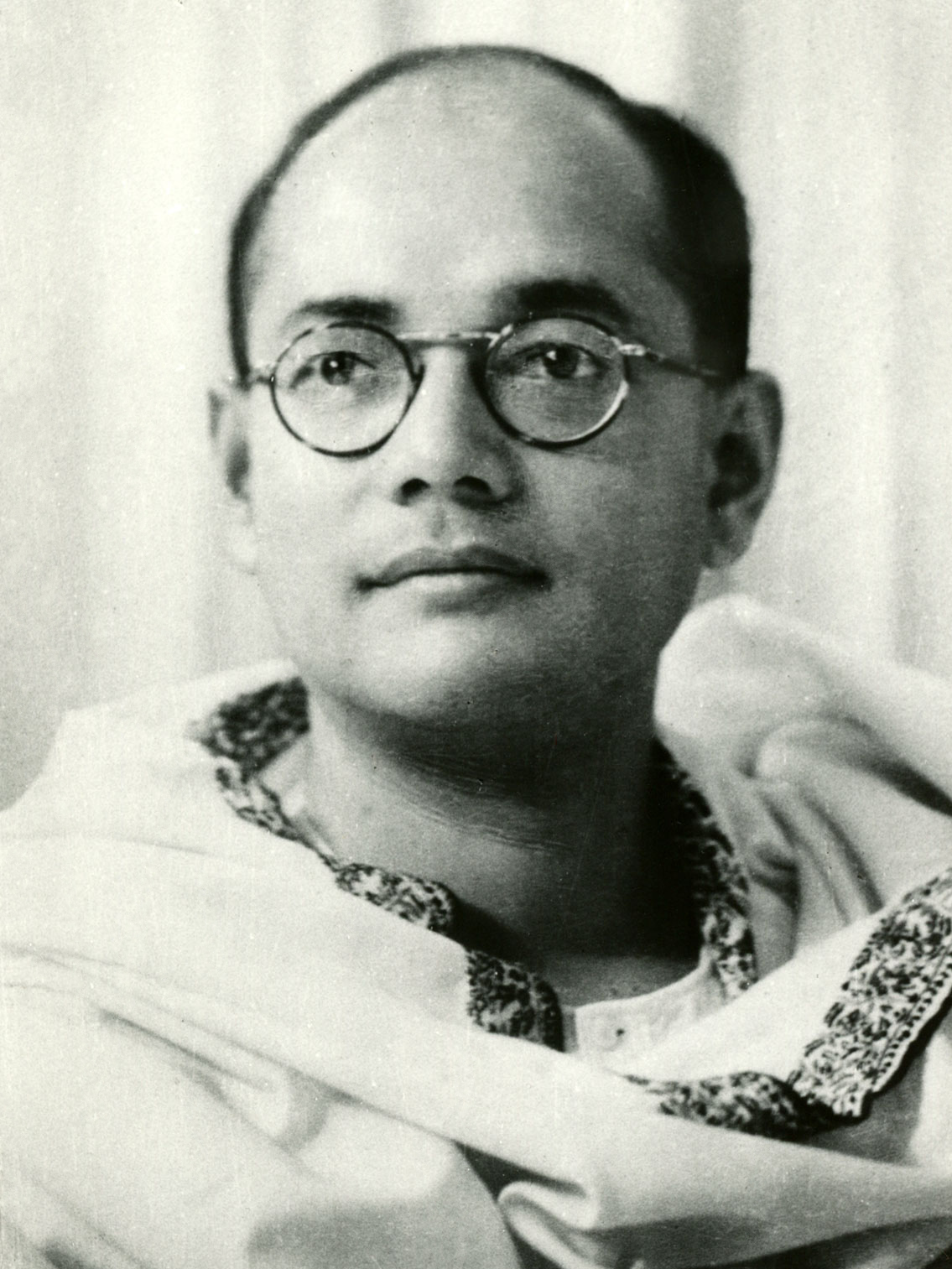Netaji Subhas Chandra Bose Biography
By Gaurav Chamoli | Article | Jun 14, 2025

Subhas Chandra Bose, popularly revered as Netaji, remains one of the most enigmatic and influential leaders in the history of the Indian independence movement. Known for his radical ideology, strategic brilliance, and passionate patriotism, Bose charted a revolutionary path that diverged significantly from the mainstream non-violent movement led by Mahatma Gandhi. This comprehensive Netaji Subhas Chandra Bose biography delves into his early life, political journey, contributions to India's freedom struggle, personal life, and lasting legacy.
Netaji Subhas Chandra Bose (Infobox)
| Field | Details |
| Name | Subhas Chandra Bose |
| Image |
|
| Caption | Netaji Subhas Chandra Bose, leader of the Indian National Army |
| Birth Name | Subhas Chandra Bose |
| Birth Date | January 23, 1897 |
| Birth Place | Cuttack, Bengal Presidency, British India |
| Death Date | August 18, 1945 (disputed) |
| Death Place | Taihoku, Japanese Taiwan |
| Resting Place | Renkō-ji Temple, Tokyo, Japan |
| Nationality | Indian |
| Citizenship | British India |
| Other Names | Netaji |
| Education | Baptist Mission's Protestant European School, Ravenshaw Collegiate School |
| Alma Mater | University of Calcutta, University of Cambridge |
| Occupation | Politician, Revolutionary Leader |
| Years Active | 1921–1945 |
| Known For | Indian independence movement, Indian National Army |
| Notable Works | The Indian Struggle (book) |
| Spouse(s) | Emilie Schenkl (secret marriage in 1937) |
| Children | Anita Bose Pfaff |
| Parents | Janakinath Bose (father), Prabhabati Bose (mother) |
| Relatives | Sarat Chandra Bose (brother) |
Netaji Subhas Chandra Bose Early Life and Education
Subhas Chandra Bose was born on January 23, 1897, in Cuttack, a vibrant town in the Bengal Presidency of British India. He was the ninth child among fourteen siblings in a distinguished and intellectually nurturing Bengali family. His father, Janakinath Bose, was a prominent advocate who later became a member of the Bengal Legislative Council. Known for his sharp intellect and moral uprightness, Janakinath ensured that his children received both quality education and strong ethical grounding. Subhas’s mother, Prabhabati Devi, was deeply spiritual and played a pivotal role in nurturing a sense of discipline, nationalism, and compassion in her children.
From an early age, Bose showed remarkable academic promise and curiosity. He began his education at the Baptist Mission's Protestant European School and later moved to Ravenshaw Collegiate School. His love for books, particularly philosophy and spirituality, took shape during these formative years. Bose was heavily influenced by the teachings of Swami Vivekananda and Ramakrishna Paramhansa, whose thoughts on fearlessness, sacrifice, and national pride ignited a fervent patriotism in him.


He pursued higher education at Presidency College in Calcutta, where he was briefly expelled due to a confrontation with British faculty over racial prejudice—a defining moment that sharpened his sense of resistance to colonial injustice. Later, he transferred to Scottish Church College and graduated with honors in Philosophy. Seeking broader horizons, he traveled to England in 1919 and was admitted to the University of Cambridge. In 1920, he successfully passed the prestigious Indian Civil Service examination. Yet, his conscience prevented him from serving the British government. In a bold act of rebellion, he resigned from the ICS in April 1921, sacrificing a secure future to fully commit to India’s liberation.
Career
Netaji Subhas Chandra Bose Career Beginnings
Returning from England with a heightened sense of purpose, Subhas Chandra Bose plunged into India's freedom movement by joining the Indian National Congress (INC). He began working closely with Deshbandhu Chittaranjan Das, whom he regarded as a political mentor. Bose was appointed CEO of the Calcutta Municipal Corporation under Das’s leadership, through which he gained crucial administrative experience. His charisma, oratory skills, and bold stand against British policies made him a rising star in nationalist circles. However, his ideals of militant nationalism frequently clashed with Mahatma Gandhi’s philosophy of non-violence and passive resistance.
Major Milestones
In 1938, Bose’s influence peaked when he was elected President of the Indian National Congress at the Haripura session. As Congress President, he advocated for the adoption of industrialization and military preparedness to confront British rule. But his assertive stance and differences with senior Congress leaders led to political friction. After his re-election in 1939, opposition from key figures like Gandhi and Nehru pushed him to resign. Not one to be deterred, Bose established the Forward Bloc within the Congress, aiming to consolidate leftist and anti-colonial forces for an uncompromising path toward independence.

Significant Achievements
During World War II, Bose saw a global opportunity to weaken the British Empire and advance India's independence cause. Under tremendous personal risk, he escaped house arrest in Calcutta in 1941, traveled through Afghanistan and the Soviet Union, and made his way to Nazi Germany. There, he sought international support and formed the Free India Centre in Berlin. However, he later moved to Japanese-occupied Southeast Asia, where he restructured and led the Indian National Army (INA), originally established by Rash Behari Bose.
Under his leadership, the INA became a formidable force, comprised mostly of Indian prisoners of war and expatriates. Bose established a provisional government of Free India in exile, recognized by Axis powers. His clarion call, "Give me blood, and I will give you freedom," inspired thousands to join the freedom movement. The INA even launched military campaigns in northeastern India, including Imphal and Kohima, although they were eventually halted by Allied forces.
Collaborations and Partnerships
Bose's strategic alliances were shaped by geopolitics. Despite ideological contradictions, he collaborated with Nazi Germany and Imperial Japan to internationalize the Indian cause. He worked closely with Japanese leaders like General Tojo and revolutionary figures like Rash Behari Bose. Though controversial, these partnerships reflected his unwavering focus on securing independence by any means necessary—a view that set him apart from many of his contemporaries.
Netaji Subhas Chandra Bose Personal Life
Marital Status and Spouse(s)
During his time in Europe, Bose formed a close relationship with Emilie Schenkl, an Austrian woman who became his confidante and eventually, his wife. The couple married in secret in 1937 in Germany, primarily to avoid political complications. Their relationship remained low-profile due to Bose’s intense political commitments and the sensitivity of his public role.

Children
Their union resulted in the birth of a daughter, Anita Bose Pfaff, in 1942. Raised in Austria, Anita Bose Pfaff later emerged as a noted economist and academic, continuing her father’s intellectual legacy in her own way.

Hobbies and Interests
Beyond politics, Bose was a scholar at heart. He had a deep love for philosophical discourse and was profoundly shaped by Eastern and Western thinkers alike. Vivekananda’s call for spiritual nationalism was a guiding light in his worldview. Bose was also drawn to poetry, literature, and classical music, which served as meditative reprieves from the high-stakes world of revolution.
Philanthropy and Activism
Bose championed progressive causes, including women’s empowerment and the upliftment of marginalized communities. He promoted the inclusion of women in the INA, most famously through the Rani of Jhansi Regiment, an all-female combat unit that reflected his commitment to gender equality in the freedom struggle. He also envisioned a socialist India with equitable distribution of resources, worker rights, and universal access to education.
Netaji Subhas Chandra Bose Death and Legacy
Circumstances of Death
On August 18, 1945, Subhas Chandra Bose was reportedly killed in a plane crash in Taihoku, now Taipei. However, the exact circumstances of his death remain one of India’s most enduring mysteries. Numerous investigations and inquiries have been launched, but none have conclusively confirmed his death. Some believe he survived and lived in disguise, further deepening his mystique.

Funeral and Memorial Details
Bose’s ashes were reportedly collected and preserved at Renkō-ji Temple in Tokyo, a place that has since become a site of pilgrimage for admirers and officials alike. Every year, tributes are paid in his honor, reaffirming the legacy of a man who refused to be forgotten.
.jpg#1749835660527)
Posthumous Recognitions
Though he was never conferred the Bharat Ratna, Bose’s contributions have been universally acknowledged. His title, Netaji, meaning “Respected Leader,” became synonymous with fearless nationalism. Monuments, postage stamps, movies, and educational institutions across India bear his name. The INA’s contributions were also officially recognized, reshaping post-independence narratives about armed resistance.
Influence on Field or Society
Bose’s legacy transcends military campaigns. He redefined Indian nationalism by emphasizing dignity, discipline, and decisive action. His vision of a sovereign, socialist, and united India continues to inspire activists, military personnel, and public leaders. His ideas on youth leadership, sacrifice, and nation-first ethos are frequently revisited in academic and political discourse.
Awards and Honors
Beyond symbolic honors, Bose’s philosophies have been incorporated into school curriculums, military doctrines, and popular culture. In 2021, the Indian government announced plans to install a grand statue of Netaji near India Gate, symbolizing his permanent place in national memory. His birthday, January 23, is now celebrated as Parakram Diwas (Day of Valor) across India.
.jpg#1749835807745)
Bibliography
Bose’s writings reveal the soul of a thinker and the fire of a leader. His most notable work, The Indian Struggle (1935), chronicles the Indian nationalist movement between 1920 and 1934 and presents his unflinching critique of British colonialism. The book was banned by the British but later became a treasured political manifesto. His speeches and letters, compiled over decades, continue to offer insight into his mind and mission.
सरकारी नौकरियों, जीके अपडेट्स और करेंट अफेयर्स की ताज़ा जानकारी सबसे पहले पाने के लिए:
-
हमारे WhatsApp चैनल को फॉलो करें:
https://whatsapp.com/channel/0029Vb6sjZz0wajwDXcd5B0U -
हमारे Telegram चैनल को फॉलो करें:
https://t.me/educationmastersin -
हमारे Facebook Page को फॉलो करें:
https://www.facebook.com/educationmastersindia




.png)
.jpg)
.jpg)


